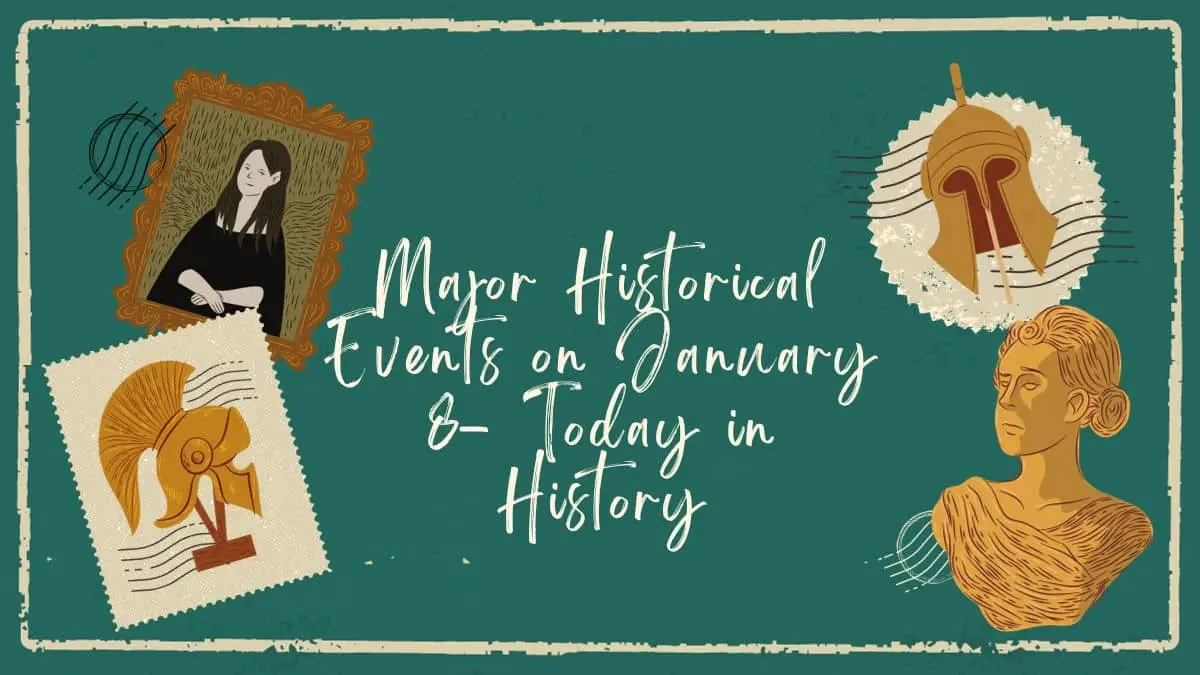Imagine stepping into a time machine and setting the date to January 8. As you journey back in history, you’ll find yourself amidst a whirlwind of captivating events, each with its own unique story to tell. In “Major Historical Events on January 8 – Today in History,” we invite you to join us on a riveting adventure through time. From record breaking deaths in recent covid-19 Pandemic to Discovery of Jupiter’s Moon, this article will transport you to moments that have defined January 8 throughout the ages.
Major Historical Events on January 8 – Today in History
1610: Simon Marius Discovers Jupiter Moons

German astronomer Simon Marius independently discovers Jupiter’s first three moons, a day after Galileo’s observation. His work, though less recognized, played a crucial role in the study of celestial bodies and the understanding of our solar system.
1675: 1st American Commercial Corporation Chartered
The New York Fishing Company becomes the first American commercial corporation to receive a charter, marking a significant development in the colonial American economy.
1705: Handel’s Opera “Almira” Premieres
George Frideric Handel’s first opera, “Almira,” premieres in Hamburg, Germany. This event marks the beginning of Handel’s prolific career and significant contribution to baroque music and opera.
1760: Comet Approaches Earth
Comet C/1760 A1, also known as the Great Comet, makes a close approach to Earth at just 0.0682 astronomical units away. Its appearance becomes a significant event in the 18th-century astronomy community.
1790: George Washington’s 1st State of the Union
George Washington delivers the first State of the Union address, establishing a tradition for US presidents to update Congress on the nation’s status and outline their legislative agenda.
1816: Sophie Germain’s Paris Academy Prize
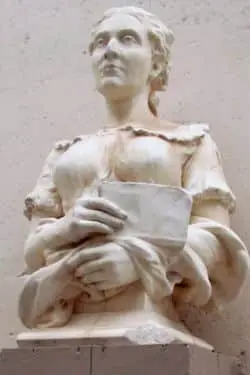
Mathematician Sophie Germain becomes the first woman to win a prize from the Paris Academy of Sciences for her paper on elasticity, breaking gender barriers in the scientific community.
1833: Boston Academy of Music Established
The Boston Academy of Music is established as the first music school in the United States, playing a pivotal role in the development of American musical education and culture.
1835: US National Debt at $0
The US national debt hits $0 for the first and only time in history, a financial anomaly in the nation’s fiscal management and a moment of brief solvency between periods of debt.
1853: 1st US Bronze Equestrian Statue
The first US bronze equestrian statue, depicting Andrew Jackson, is unveiled in Washington, D.C., symbolizing national pride and artistic achievement in American sculpture.
1861: Union Forces Abandon Fort Barrancas
During the Civil War, Union forces strategically relocate from Fort Barrancas to Fort Pickens near Pensacola, Florida, reflecting the military’s tactical decisions in the early stages of the conflict.
1889: Dr. Herman Hollerith’s Tabulating Machine Patent
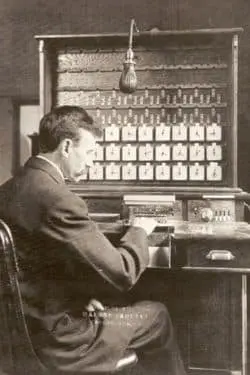
Dr. Herman Hollerith receives the first US patent for a mechanical tabulating machine, a significant advancement in data processing that would eventually lead to the development of modern computers.
1897: Michael Eagan Wins Handball Championship
Michael Eagan wins the first US national amateur handball championship, marking the beginning of organized handball competitions in the United States and contributing to the sport’s growth and popularity.
1902: Landon’s Bill on Street Behavior
New York State Assemblyman Francis G. Landon passes a bill criminalizing men for turning around on a street and “looking at a woman in that way,” reflecting societal attitudes and legal approaches to gender and public conduct at the time.
1918: Mississippi Ratifies Prohibition Amendment
Mississippi leads the way as the first state to ratify the 18th Amendment to the US Constitution, beginning the Prohibition era by legally banning the manufacture, sale, and transportation of alcohol across the country.
1929: 1st Netherlands-West Indies Telephone Connection
The Netherlands and West Indies establish their first telephone connection, marking a significant step in global communication and bridging vast distances, enhancing political, social, and economic interactions between the regions.
1951: Rediscovery of Cahow in Bermuda

Thought extinct since 1615, the Cahow, or Bermuda petrel, is rediscovered in Bermuda, highlighting the resilience of nature and the importance of conservation efforts for threatened species worldwide.
1959: Charles de Gaulle Inaugurated
Charles de Gaulle is inaugurated as president of France’s 5th Republic, a significant political shift that strengthens the executive power and stabilizes the government after years of parliamentary instability.
1962: Jack Nicklaus’ Professional Debut
21-year-old Jack Nicklaus, who would become a legendary golfer and future Hall of Famer, makes his first professional appearance, tying for 50th place at the Los Angeles Open.
1968: Jacques Cousteau’s Undersea Special
Jacques Cousteau’s first undersea special airs on US network TV, captivating audiences with the mysteries of the ocean and sparking a global interest in marine conservation and exploration.
1974: Gold and Silver Reach Record Prices
The price of gold reaches a record $126.50 an ounce in London and Silver also hits a record, reaching $3.40 an ounce in New York reflecting economic uncertainty and the increasing value of precious metals.
1976: Franklin Mint Strikes Gold Coins
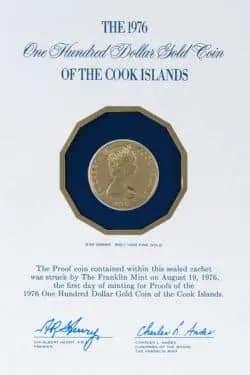
The Franklin Mint strikes the first gold coins for the Netherlands Antilles, symbolizing the region’s economic aspirations and the global significance of commemorative coinage.
1978: Harvey Milk Elected in California
Harvey Milk is elected to public office in California, becoming the first openly gay person to achieve such a position, marking a significant moment in the fight for LGBTQ+ rights and representation.
1981: Isabel Allende Begins “The House of the Spirits”
Isabel Allende begins writing a letter to her dying grandfather, which will evolve into her first novel, “The House of the Spirits,” blending personal history with magical realism and marking the emergence of a literary icon.
1988: HP Introduces HP-28S Calculator
Hewlett-Packard introduces the HP-28S Advanced Scientific Calculator, a significant technological advancement offering complex computing capabilities.
1991: Tamas Darnyi’s World Record Swim
Hewlett-Packard introduces the HP-28S Advanced Scientific Calculator, a significant technological advancement offering complex computing capabilities
1993: “El Mariachi” Debuts at Toronto Film Festival

Robert Rodriguez’s “El Mariachi” debuts at the Toronto Film Festival. As the lowest-budgeted film ever to gross $1 million, it becomes a testament to independent filmmaking and Rodriguez’s innovative storytelling.
2004: RMS Queen Mary 2 Christened
RMS Queen Mary 2, the largest passenger ship ever constructed, is christened by Queen Elizabeth II. It symbolizes a new era in luxury ocean travel and engineering marvels.
2014: Interstellar Meteor Crash in Papua New Guinea
CNEOS 2014-01-08, the first known interstellar meteor to hit Earth, crash-lands in Papua New Guinea, providing valuable scientific data and insights into interstellar objects.
2018: US Record Year for Natural Disasters
The United States announces a record year for the cost of natural disasters, with damages totaling $306 billion in 2017, highlighting the increasing impact and frequency of extreme weather events.
2020: Justin Bieber Reveals Lyme Disease
Singer Justin Bieber publicly reveals his battle with Lyme disease, bringing attention to the infectious disease spread by ticks and its impact on individuals, even those in the public eye.
2022: UK Passes 150,000 COVID-19 Deaths
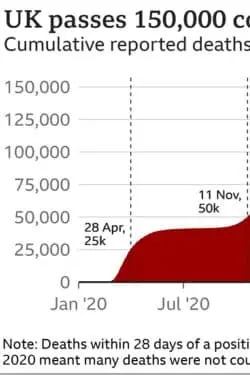
The United Kingdom surpasses 150,000 COVID-19 deaths, becoming the first country in Europe and the seventh globally to reach this grim milestone, reflecting the pandemic’s devastating impact.
2023: Supporters of Bolsonaro Attack Brazilian Government Buildings
Supporters of former Brazilian President Jair Bolsonaro storm government buildings, including the High Court and Presidential Palace. Over 1500 are later arrested in a stark example of political unrest and division.
Also Read: Major Historical Events on January 5 – Today in History
